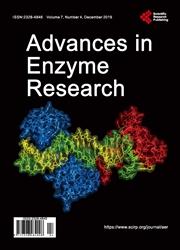Escherichia coli superoxide dismutase expression does not change in response to iron challenge during lag phase: Is the ferric uptake regulator to blame?
引用次数: 4
Abstract
Intracellular iron levels and the expression of superoxide dismutase (SOD) and hydroperoxidase (HP) are regulated in Gram-negative bacteria by the iron(II)-activated ferric uptake regula- tor (Fur). We have previously observed that the expression of SOD in exponential phase Escherichia coli is dependent upon the redox state of iron in media, consistent with the ferrous specificity of Fur regulation (Bertrand et al., Med. Hypotheses 78: 130 - 133, 2012). Through the non-denaturing electrophoretic technique we have determined the Escherichia coli expression profiles of SOD and HP in response to iron challenge throughout lag, logarithmic, and stationary phases of replication. Lag phase SOD presented an unusual expression profile such that SOD expression was unresponsive to iron challenge, analogous to observations of mutant strains lacking Fur and of E. coli incubated in iron-deplete media. Challenging Escherichia coli with iron during logarithmic phase revealed that length of exposure to oxidants is unlikely to be the cause of SOD unresponsiveness in lag phase. HP activity was up-regulated two- or three-fold throughout all growth phases in response to iron challenge, but did not present redox- or growth phase-specific outcomes in a manner analogous to SOD. We hypothesize that low Fur levels during lag phase are responsible for unresponsive SOD.在迟滞期,大肠杆菌超氧化物歧化酶的表达不改变对铁的响应:铁摄取调节剂是罪魁祸首吗?
革兰氏阴性菌胞内铁水平和超氧化物歧化酶(SOD)和氢过氧化物酶(HP)的表达受铁(II)激活的铁摄取调节因子(Fur)的调控。我们之前观察到,指数期大肠杆菌中SOD的表达依赖于培养基中铁的氧化还原状态,这与Fur调节的铁特异性一致(Bertrand et al., Med. hypothesis 78: 130 - 133, 2012)。通过非变性电泳技术,我们确定了大肠杆菌在复制的滞后期、对数期和固定期对铁挑战的反应中SOD和HP的表达谱。迟滞期SOD表现出不寻常的表达谱,使得SOD的表达对铁的挑战没有反应,类似于缺乏Fur的突变株和在缺铁培养基中培养的大肠杆菌的观察结果。在对数期用铁挑战大肠杆菌表明,暴露于氧化剂的时间不太可能是迟滞期SOD无反应性的原因。在铁胁迫下,HP活性在所有生长阶段均上调两到三倍,但不表现出与SOD类似的氧化还原或生长阶段特异性结果。我们假设迟滞期的低皮毛水平是导致SOD无反应的原因。
本文章由计算机程序翻译,如有差异,请以英文原文为准。
求助全文
约1分钟内获得全文
求助全文

 求助内容:
求助内容: 应助结果提醒方式:
应助结果提醒方式:


